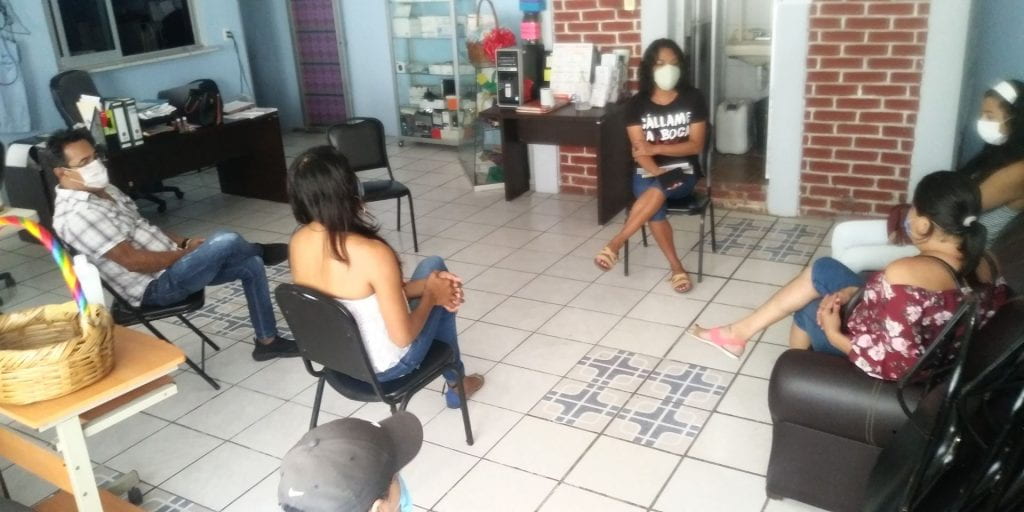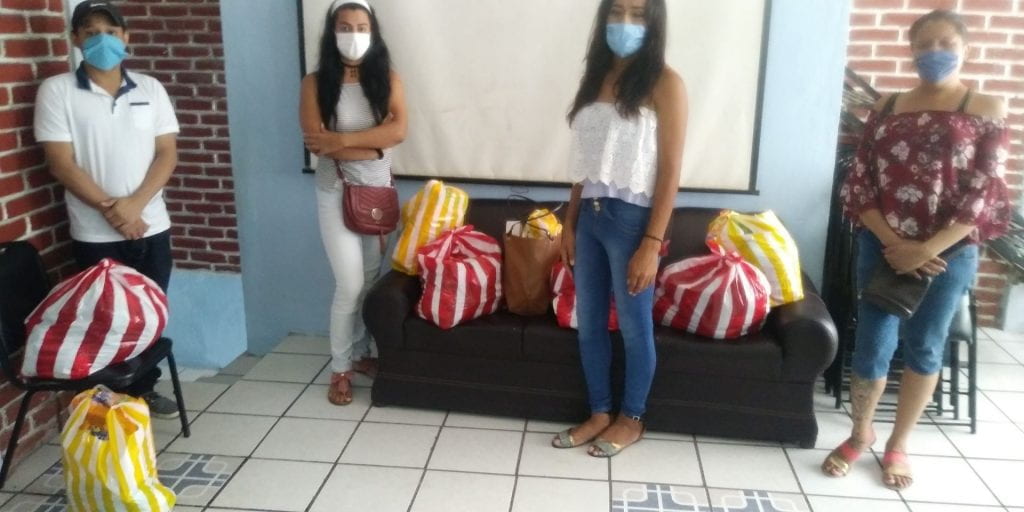By Ailsa Winton and Rosember López Samayoa.*
Spanish version here.
Many NGOs have all but ceased activities since the COVID-19 pandemic made itself felt in Tapachula – a town a short distance from Mexico´s border with Guatemala – but a few decided to carry on. Here the team of Una Mano Amiga en la Lucha contra el SIDA (UMALCS) (A Friendly Hand in the Fight Against AIDS) share some of their thoughts and experiences about their work with the local and migrant communities during the pandemic.**
What have the responses of local organizations and government institutions to the pandemic been like?
It seems to us that the government response has been rather ineffective; it’s as if the only problem that exists here on the southern border is COVID. The partial or total closure of health centres has made meeting the needs of both the migrant and local population very difficult. In the case of our work on sexual health, we still see people but have nowhere to refer them to. It seems to us that in a pandemic, health services should have increased their capacity, not done the opposite.
Regarding the immigration and asylum authorities, there was an imbalance there; they stopped providing services on federal government orders, but migrant detentions were not stopped, nor was the violation of migrants’ human rights.
For migrants, it is also to do with health and emotional well-being, in terms of stress and anguish not only about serious economic instability, but also about their stalled application process, and the decision of whether to abandon it altogether and try to return to their country of origin, or carry on towards the northern border, alone and exposed to the dangers both of moving, and of the pandemic itself.

On the issue of NGOs, we have a lot to reflect on, because NGOs are usually among the first to see to people’s needs, especially organizations that work on migration and human rights. But we did not see that happen; many stopped providing services. Humanitarian actions that have been carried out during the pandemic have shown important synergies between certain organizations, but the absences of many other organizations were also very evident.
For our part, we have continued to work providing services throughout the pandemic. We did have to make adjustments to how and when we work, and for now we have had to stop going out to make first contacts on the street, but we have tried to carry on giving assistance to LGBTI migrants and asylum seekers in our offices, particularly for issues relating to sexual and reproductive health and HIV.
But we feel, overall, that the response in general ought to be broader; in an emergency or epidemic, institutions, NGOs and international organizations lack the foundations for a more active, timely response.
But one good thing is that in Tapachula, as a result of the recent migrant exoduses (‘caravans’) from Central America, a civil society monitoring group had been set up, which can be reactivated. There are also organizations that may not be carrying out activities in the field at the moment, but that do denounce abuses against migrants, and in this way have played an important role during the pandemic.
What do you think the pandemic has shown us, and how has it affected your work?
Something that this pandemic has shown is how people organize themselves, especially those who live in contexts of overcrowding. There, social organization has either been built up or broken down, depending on the way people’s social fabric is constructed. Undoubtedly, for those who can’t find a better way of organizing, we have seen increased vulnerability.

It has also shown the emotional effect that confinement can have. In the case of migrant shelters, where people were effectively shut in, the issue of mental health is really evident. Confinement meant so much, even in the context of the many challenges of living in a shelter – so much so that many decided to leave the shelters during the pandemic, despite having nowhere to go.
Perhaps what has most affected us is that our work is mainly face-to-face and in the field, where it would be hard to make use of digital platforms. We have stopped first contacts in public now, and so the issue is how to get to the people we need to reach, not through the places they go as in the past (bar, parks, the street), but rather via online platforms.
What are the lessons or reflections you have taken from the experience of working and living in the midst of this pandemic?
COVID has again revealed the issue of discrimination. For example, many religious organizations have pointed to the LGBTI population as being responsible for this epidemic, saying it’s divine punishment. This shows that the issue of stigmatization and discrimination in health matters is still present, just as it was during the HIV epidemic.
It has been scary; you’re worrying about your team, about the lack of adequate social security, what happens if they get infected. We have to work on emotional containment, on accompanying other people. Simple physical contact of one person with another can have surprising results, but with COVID this cannot be done. We have to get humanity back in organizations, take care of ourselves as one organism.
We have to change, to work differently, without losing the human touch. There is still a lot of uncertainty, but we must find a way of adapting how we work. There may be positive outcomes of this too, like how some of these changes could help denormalize some sexual violence, and others we may not have foreseen.
Without a doubt, we face important challenges now, but as part of civil society, we have to continue developing in synergy with others for the benefit of the most vulnerable populations.
* With contributions from the UMALCS team: Erika Guadalupe Sumuano Moreno, Yadira Esmeralda Guerrero Castro, Esau (Essa Lilith) Pérez Hernández, Gonzalo Ernesto Cue Rasgado, Giseth Gordillo Verdugo, Francisco Javier Meza Rodríguez, Margarita Concepción Morales Villanueva, Alfredo Alejandro Marroquín Saucedo, and Juan Carlos Veliz Sempoll.
** Responses have been translated from Spanish by Ailsa Winton.

